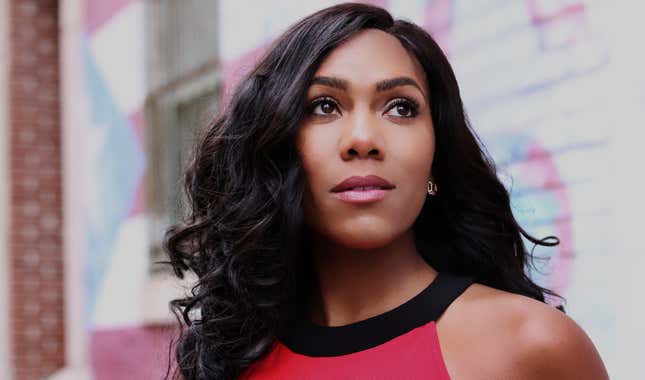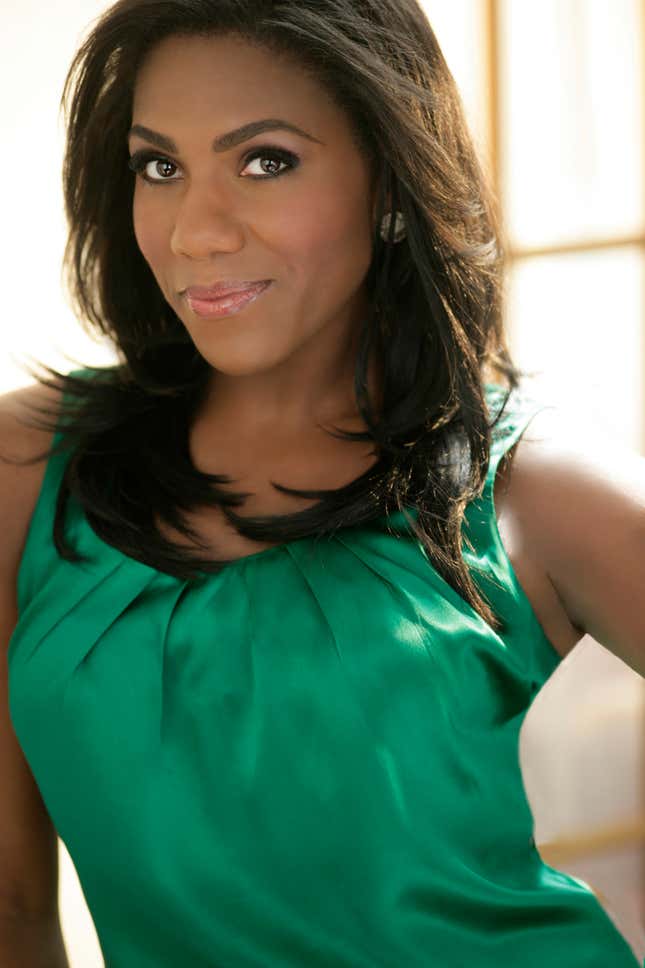
Amid the surrealist sets, majestic costumes, soaring voices and intricate harmonies of the Met Opera’s current revival of Philip Glass’ Akhnaten, based on the 17-year reign of the revolutionary 18th Dynasty Egyptian king, one of the most striking elements is that of his famed queen, Nefertiti.
Performed by mezzo-soprano sensation J’Nai Bridges (pronounced “Jah-Nay”), Nefertiti is equal parts impervious queen, renowned beauty, devoted helpmate and mother, and, thanks to her flowing blue wig and gold-gilded crown, reminiscent of a superhero. Altogether, it’s an aspirational combination many women (and especially many black women) are all too familiar with. And yet, even while making her Met debut, Bridges’ presence is already undeniably regal.
“I couldn’t imagine a better way to come into [the Met] than playing an African queen,” she told us just ahead of the premiere of what is now a sold-out run.
Bridges knows a thing or two about queens: This June, when making her San Francisco Opera debut as Carmen in Georges Bizet’s opera of the same name, she likened the role to Queen Bey herself, saying, “I call this the Beyoncé role of opera because one must be able to sing and dance at the same time, which is much harder than it looks.” As a result of Bridges’ powerhouse performances, fans and media alike have given her a similar moniker, now calling her the “Beyoncé of Opera” (and no, not of “hip-hopera”—though given Bridges’ multi-genre interest, she could undoubtedly conquer that, too).
But the story of one of opera’s newest stars began in Tacoma, Wash. Like many families, her parents—an educator mother and career military father—wanted more for their four children than they’d had growing up, and encouraged them to claim it on their own terms. “Because my mom was an educator, she realized early on with her children that there’s no one way for children to be,” Bridges explained. “[She believed] the beauty of life is to explore where your strengths are, and to nurture that.”
As it turned out, Bridges’ strengths lay in multiple areas; after demonstrating an early propensity for music (which began by banging on the piano as a toddler), she was placed in classical piano lessons. “And that’s only because the person who’d lived in our home before left their piano because they had no way of getting it out the door,” she laughs.
Her love for music had been born, but Bridges’ stunning vocal talent would go undiscovered until she found herself in need of an art elective during high school. With only Honors Choir left as an option, she auditioned—and of course, was accepted.
“I loved it, and the teacher immediately noticed that I had a special gift—a natural gift,” she says. After following her teacher’s suggestion that she take private lessons, “my whole world just opened up...I just fell in love with it immediately.”
Simultaneously, Bridges was also a promising high school basketball player, playing all four years at the varsity level and even becoming a team captain—that is, until she was forced to choose between sports and singing. When a rehearsal for her first opera—as part of the chorus of a local production of Puccini’s Tosca—caused her to be late to a championship game, she, a high scorer, was benched, publicly berated and threatened to be penalized for the remainder of the season by her coach.
“And that was the last day of my competitive basketball career—and it was a big deal,” Bridges, a self-proclaimed “Type-A,” now recalls. “He called himself trying to teach me a lesson, but it was really childish, and I’ve always had a really strong personality and I refused to be humiliated.”
Standing up for herself resulted in Bridges relinquishing several basketball scholarships, which she quickly scrambled to turn into singing scholarships, after only a few months of singing lessons. “This singing thing brought out sensations in me that I’d never had before, and I really wanted to explore that further,” she says.
Quickly pivoting to audition for conservatories (and being accepted for most), Bridges chose Manhattan School of Music. “I knew I had to be in New York,” she says. “I didn’t know why, I didn’t know when, but New York was calling me.” She would subsequently attend Philadelphia’s Curtis School of Music for graduate school; a conservatory so prestigious, its students attend for free.
“This was just a major sign that I had something that needs to be pursued,” she now says. “When I got into Curtis, it was like confirmation.”
What happened next was even further confirmation: while spending three years at Chicago’s Lyric Opera, Bridges’ first manager mentally signed her before she even sang a note, just based on her entrance into the room.
“I’ve always just worked really hard at whatever it is...thankfully, people have grasped onto me and also believed in me, and have given me these opportunities,” she now concedes. “And that’s the key...you can have all the talent in the world, but if you’re not ready when those opportunities come, it doesn’t matter...it comes and it goes in an instant, and I’m just thankful that I’ve been ready.”
Already part of a revered operatic legacy, Bridges is keenly aware of the talents who made her own success possible, taking none of her growing prestige for granted.
“Black opera singers have always been around; it’s just the opportunities have not been presented or taken away from us,” she tells me. “Some of the people who have come before me, it was a battle, and I would not be here without them. So I always like to give honor to them, but I believe that I was made to sing opera and to bring people closer to this thing that they find is only for a certain demographic—rich white people, or upper echelon—and it’s just not true.”
On Sept. 30, the world lost legendary diva Jessye Norman—coincidentally, on the same day Bridges began rehearsals for Akhnaten. “My very first rehearsal at the Met, I walked into the stage door, looked down at my phone, and I got an alert that Jessye Norman had died. And I immediately just started crying because, first of all, she is one of the reasons why I sing classically. It was the first voice that I heard,” she says.
“She was the first classical voice that I heard, and people often say that we have similar timbres in our voices, so I just felt that she’s been with me through this whole thing...she was really the first black opera singer that I had a connection with,” Bridges continues, as she recalls meeting Norman years as a young singer. “She just gave me this wisdom...she said ‘sing from the depths of your soul.’ And I will just never forget that—because she didn’t know me; she didn’t have to say that—I honestly felt, from that moment, she was giving me the courage to do this thing because prior to that, I really had no affiliation with any other black opera singer.” (Norman, in turn, credited earlier icons Marian Anderson, Dorothy Maynor and Leontyne Price for empowering her to sing some of the greatest roles in opera.)
“[Norman] inspired me and gave me hope and the courage,” Bridges adds. “Because representation just matters; it just does.”
Even in the polytonal, often monosyllabic lyrics of Akhnaten, Bridges’ voice carries the depth Norman urged her to have. Remarkably, Bridges’ carriage also suggests the elegance of the late diva—and Price, before her—not to mention those of two of Bridges’ current mentors, the also groundbreaking Kathleen Battle and fellow mezzo-soprano Denyse Graves (the latter of whom Bridges shares a repertoire with and says, “She’s just been so generous.”)
“I’m thankful because we need that—I need that. It’s one thing to be an opera singer; it’s another thing to be a black opera singer,” says Bridges of the mentorship she’s found in the field—which she now pays forward by visiting inner-city schools wherever she performs and occasionally giving free voice lessons to young singers, helping to offset the costs of what Bridges acknowledges is a “very expensive career.”
“It’s huge,” she says of the support.
Also huge is the respect Bridges has earned in her still-growing career. When Audra McDonald, another icon she deeply admires, was unable to appear at Norman’s recent memorial due to a family emergency, it was Bridges who was called upon to sing in her place. (Bridges was also a featured singer at the Met’s tribute to the late diva last Sunday.)
“It felt in that moment, like the torch was being passed a bit—and I don’t say that in a self-serving way...it just felt like Jessye Norman was passing me the torch and saying ‘You are here for a reason: to carry my legacy on; to carry this thing on.’”

“I didn’t realize how much people were left out of the picture until I started singing more for my community,” she later adds. “I’ve been so concentrated and surrounded with a certain demographic of people, you kind of lose sight of everybody else, and that is something that I don’t ever want to do, because I didn’t get here from losing sight of people...It’s definitely my responsibility to expose as many people to opera as possible—and specifically black Americans; black people around the world.”
Bridges also plans to explore as much as possible, whether it be working with musicians of other genres (Beyoncé would be a dream collaborator), starting a line of couture eveningwear (“Because who doesn’t love a good gown?” she laughs), or exploring an acting career, as McDonald has successfully done.
“I just want to do everything,” says Bridges, whose next project will be an album. “I just want to nurture all of me, and not shut down any possibilities, because we only have one life and I just believe in living life, and being happy.”
You can see J’Nai Bridges sing the role of Nefertiti in the Met Opera’s sold-out production of Akhnaten via their “Live in HD” option. Akhnaten will be broadcast at cinemas across the world on Dec. 4; you can find a location near you here.

